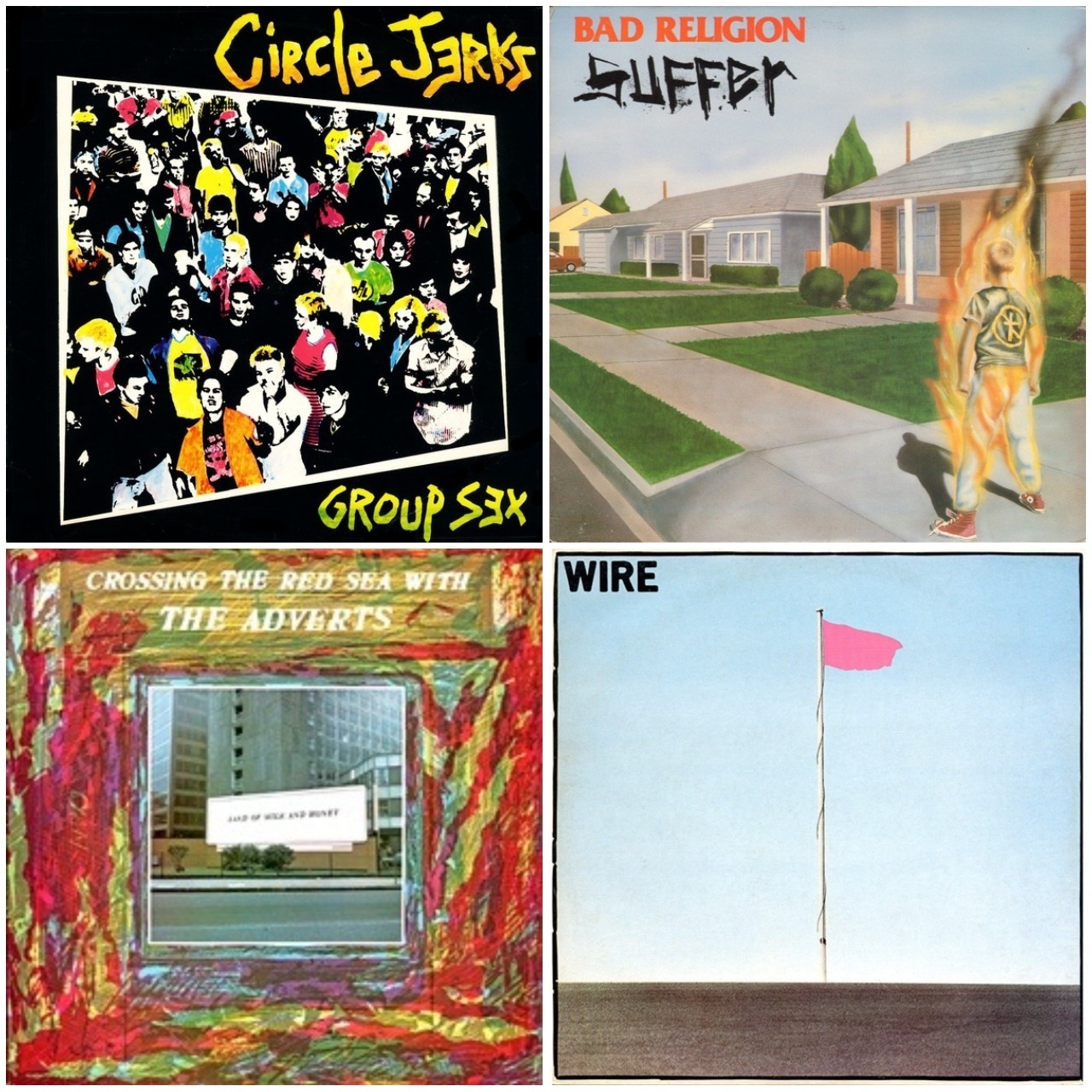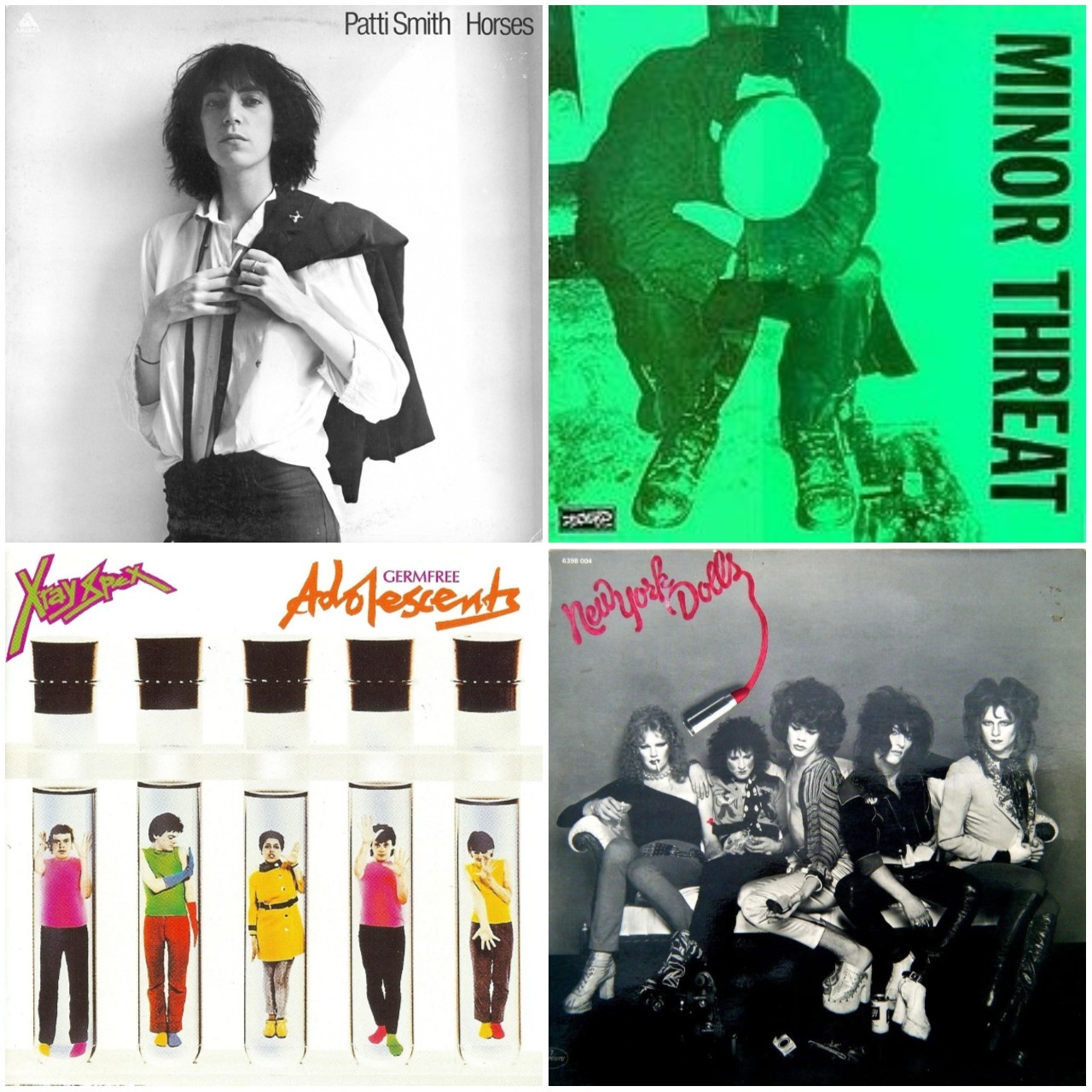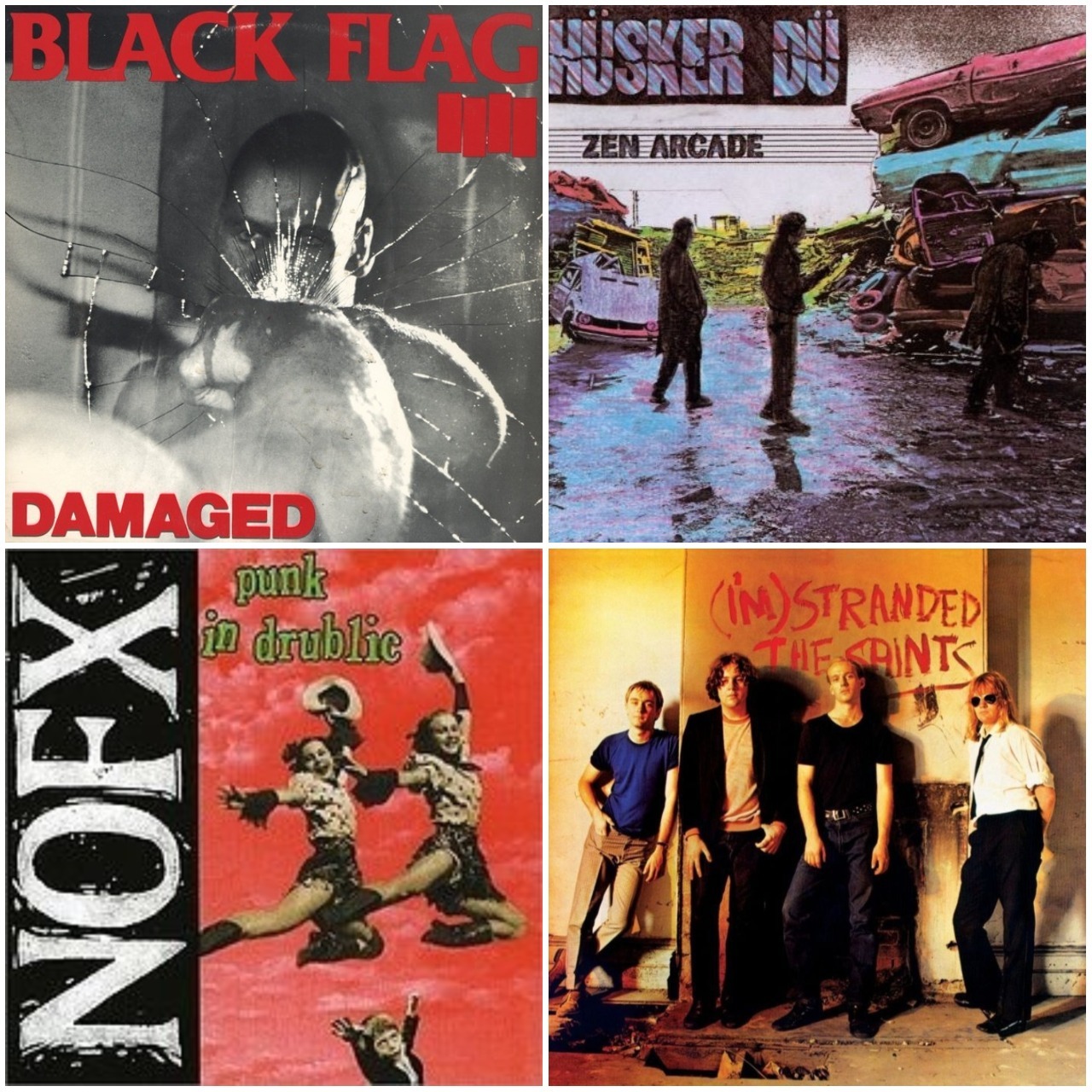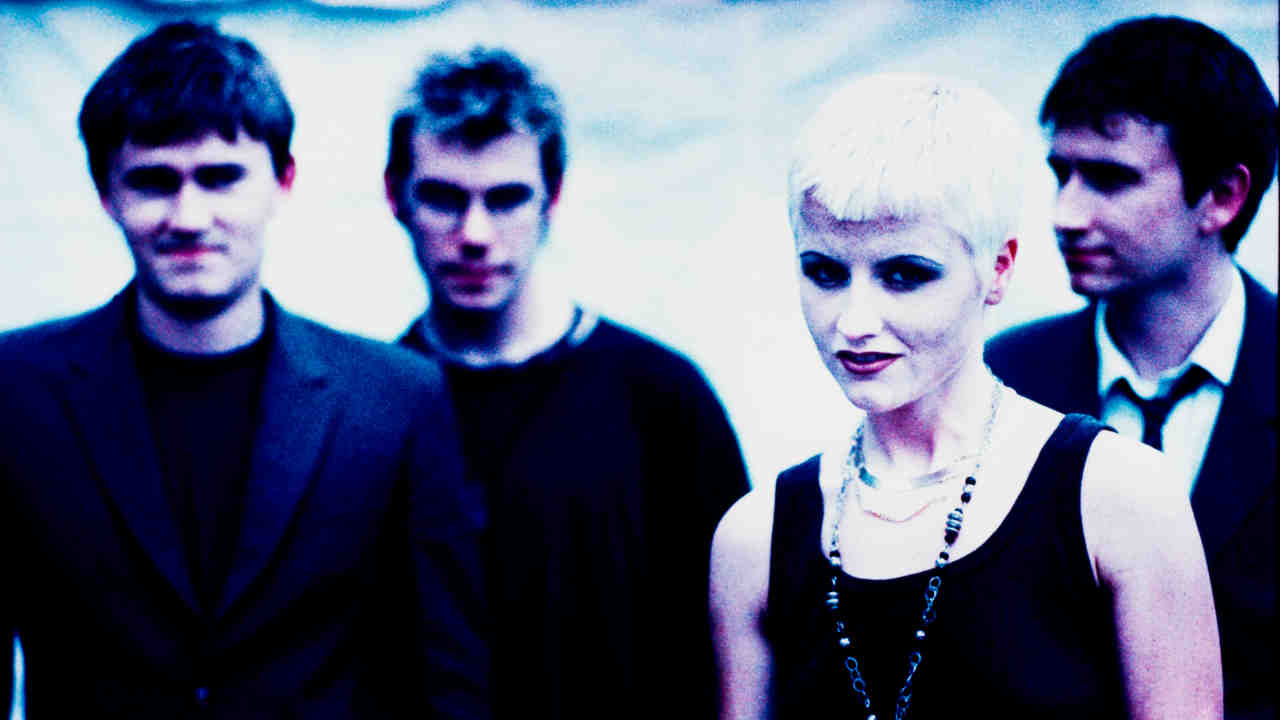Select the newsletters you’d like to receive. Then, add your email to sign up.
You are now subscribed
Your newsletter sign-up was successful
Want to add more newsletters?
30) Circle Jerks – Group Sex (1980)
With Group Sex, Circle Jerks distilled the sound of the burgeoning LA hardcore scene into a furious, breakneck 15-and-a-half-minutes. Hardcore at that time was ferociously anti-mainstream, perhaps the last rock’n’roll sub-genre ever created with no commercial aspirations whatsoever. While it sparked in San Francisco as a reaction to the hippies who still roamed freely, it really caught fire in the early ‘80s in the gang-strewn wasteland of Los Angeles, with feral audio terrorists like Circle Jerks leading the way – bands who were all tooth and nail and rag and bone, gushing buckets of testosterone as they raged against the machine in brutal two-minute chunks of three-chord flail.
Recorded after frontman Keith Morris left his previous band Black Flag, Group Sex recycled two Flag numbers (Wasted, Don’t Care) among its dizzying 14 tracks, causing a certain amount of contention between Morris and Black Flag songwriter (and infamous grouch) Greg Ginn in the process. Black Flag ultimately responded with the You Bet We’ve Got Something Personal Against You! grudge track.
“I discovered Circle Jerks right after Devo,” Dandy Warhols frontman Courtney Taylor-Taylor told TeamRock in 2016. “That music was just completely fucked up – they were smart alecs. Even to this day Group Sex sounds incredible. It’s 14 songs in 15 minutes and every one of them shows masterful musicianship and an utter disregard for anything traditional or corporate. Around that time I decided to cut my hair off. I knew how to sew, so I could take my jeans and get my mom’s blouses out of her closet and my dad’s army boots, go downtown and spend 14 bucks on a big punk rock belt. And wear make-up.”

29) Bad Religion – Suffer (1988)
Suffer was released at a tricky time in Bad Religion’s career. Having released the angst-ridden How Could Hell Be Any Worse? in 1982 and the synth-heavy progressive rock album Into The Unknown in 1983, the latter had baffled the punk scene and left Bad Religion struggling to pick up the pieces. To make matters worse, guitar player Brett Gurewitz was battling with a heroin addiction. As a result, the group disbanded in 1984.
Gurewitz cleaned himself up after a stint in rehab and in 1987 Bad Religion reunited with their original line up. Suffer was recorded over 10 days and showcases the band’s signature sound at its best: straightforward punk rock with buckets of melody. It’s a direction that Bad Religion still thrive on almost three decades later.
Greg Graffin’s vocals may bear some similarity to Social Distortion frontman Mike Ness, but when backed up with the driving guitars of Gurewitz and Hetson, Jay Bentley’s catchy bass lines and Pete Finestone’s no-nonsense drumming, Graffin’s voice takes on a more authoritative role, spewing powerful rhetoric. Lyrically, Graffin confidently employs phrases that exhibit a verbal intellect which, up until then, contradicted punk’s erroneous reputation of being music for the empty-headed youth. Graffin’s use of language ushered in a new age of punk, where bands wouldn’t need to dumb down their music for the purpose of being ‘punk’.
The latest news, features and interviews direct to your inbox, from the global home of alternative music.
Consequently, Suffer introduced a wave of daring punk acts who mixed articulate lyrical ideas with a smart sense of melody. Most notable of these bands were NOFX, whose frontman Fat Mike has since paid tribute to Suffer citing it as “the record that changed everything”.
“We were hanging out with the Operation Ivy guys – who ended up becoming Rancid – and they were listening to Suffer a lot,” Offspring frontman Dexter Holland told Spin in 2010. “It stood out because it had a lot of melody to it.”
Suffer’s importance as a benchmark release of California’s melodic punk rock scene cannot be overstated. In the same way that the DC punk scene had been revitalised with ‘revolution summer’ in 1985 with the emergence of original emo bands in the shape of Rites Of Spring and Embrace, Pennywise’s Fletcher Dragge has often correctly described Suffer as the album that reignited a turgid and directionless west coast scene. The demise of LA’s Black Flag and San Francisco’s Dead Kenndys, plus a proliferation of copycat violent hardcore bands had turned the stale scene, but Suffer – all at once melodic, erudite, poignant and rousing – landed like an incendiary.
28) The Adverts – Crossing The Red Sea With The Adverts (1978)
Synonymous with the earliest days of the Roxy, Covent Garden’s sweaty punk mecca, The Adverts were always different from the rest. Part of the appeal was leather-togged bassist Gaye Advert, one of the first truly iconic female punks, while the songwriting chops of frontman TV Smith possessed both a blazing intelligence and scabrous wit.
The only downside of 1978’s scintillating debut Crossing The Red Sea was the omission of ace single Gary Gilmore’s Eyes, in which the executed US murderer bequeaths his organs to an unwitting patient. One Chord Wonders and Bored Teenagers, meanwhile, skilfully skewered the lazy perceptions of punk, without ever quite making clear just what side Smith is on.
“One Chord Wonders is a storming mass of noise that celebrates the band’s musical limitations and the general public’s response to punk with lyrics so pithy you’d swear they’d been wrapped round a citrus fruit,” wrote Paul Kerr for the 405 in 2011. “Bored Teenagers is throwaway punk so archetypical that tongues have surely been introduced to cheeks along the way. Safety In Numbers is a critique of the bandwagon jumpers that infest, and ultimately destroy, any scene. On The Roof starts deceptively slowly before exploding into ear splitting life, while the angular rhythms of Newsboys were post punk before punk had even passed it’s first flush of youth.”
27) Wire – Pink Flag (1977)
Wire frontman Colin Newman often likes to riff on the fact that his band are what he calls “the most famous band you’ve never heard of.”
“Our fans assume that Wire is massive – like, we’ve all got mansions,” Newman told Rolling Stone in 2017. “And then there are lots of people who know groups who are more successful than Wire who’ve been influenced by Wire – yet they’ve never heard of Wire. It’s a very strange kind of fame.”
Nevertheless, the temptation remains to take stock of their remarkably influential career – not least the far-reaching impact of their seminal 1977 debut Pink Flag. The album’s fandom extends from left‑field thinkers like My Bloody Valentine, Fischerspooner and R.E.M. to Flying Saucer Attack, Sonic Youth and Yo La Tengo. It’s slightly perverse, and entirely fitting, that a band who’ve always defied easy classification started life on a prog label (Harvest) just as punk broke.
“Wire have dwelled in the recesses of underground rock’s vanguard for the past four decades,” wrote Rolling Stone. “When their peers in England were exploring savage maximalism, they became punk’s great self-editors – issuing their debut, Pink Flag, in 1977, which somehow improbably packed 21 songs into 36 minutes.”
“Pink Flag was a fractured snapshot of punk alternately collapsing in on itself and exploding into song-fragment shrapnel,” wrote Pitchfork in 2006. “The record’s minimalist approach means the band spends only as much time as needed on each song – five of them are over in less than a minute, while a further nine don’t make it past two. It’s clear you’re not getting a typical 1977 punk record from the opening seconds of Reuters, an echoing bass line that quickly comes under attack by ringing but dissonant guitar chords. The tempo is arrested, lurching along to the climactic finale when Colin Newman, as the narrating correspondent, shouts ‘Looting! Burning!’ and then holds out the lone syllable of ‘rape’ twice over descending chords, which grind to a halt over chanting voices. It’s all the bombast, tension, and release of a side-long prog opus in just three minutes.”

26) Patti Smith – Horses (1975)
Rarely has there been such a cataclysmic collision of high and low art as when Patti Smith’s album Horses was released in ’75. With Smith still more poet than singer at the time of its release, the album grew out of her readings-cum-performances at New York’s St Mark’s Church in 1971.
She’d convinced rock critic and record store clerk Lenny Kaye to provide both moral support and a rather minimalist musical backdrop to her feverish poetry with his electric guitar. Together they created something raw, deconstructed and haunting.
Despite an offer from Johnny Winter’s manager, Steve Paul, to get her a record deal in those early months, Patti demurred, explaining that she “didn’t have a mission yet”. Or a band. But over the next two years, Kaye and newly hired keyboard player Richard Sohl brought in bassist Ivan Kral and drummer Jay Dee Daugherty, and Patti declared that she was ready to transfer her poetry to another medium: “In 1974 I saw Television at CBGBs and I saw what I perceived as the future.”
With Velvet Underground member John Cale producing, Smith and her band recorded their debut album at the famed Electric Lady Studios in NYC. Cale seemed a perfect choice, but he and Smith butted heads from the onset. Smith confesses: “I drove John crazy.” After one particularly frustrating conflagration Cale asked her why she chose him. “Because your records sound so good,” she replied. “You bloody fool, you should have picked my engineer,” Cale countered. The band decided to reject all Cale’s suggestions, and as a result they found their own voice in the struggle.
Smith poured her soul into Horses, especially on the first track, Gloria, drafting one of the most celebrated opening lines in all of rock history: ‘Jesus died for somebody’s sins, but not mine’ (something she commandeered from her poem Oath). More declaration of personal autonomy and freedom than a rejection of her own personal God, she neatly melded the strident poem into a rather slurry speeded-up version of Them’s garage rock classic that put Van Morrison’s on the map.
Crawdaddy! magazine called the song a “declaration of existence,” but for the rest of us it was Smith’s coming out party – and we’re not speaking sexually, despite the provocative lines about a ‘sweet young thing humping on a parking meter’. The confusion never bothered Smith. “I’ve never been gender specific, or wanted to be gender specific as an artist or a human being.” Equally misunderstood is Redondo Beach, which critics surmised was about a quarrel between two Sapphic lovers, one of whom committed suicide. Not so. It was inspired by a rare spat with her sister Linda, who left in a rage, and didn’t return that night.
Ultimately Horses was more call to action than true album, helping to spawn a cultural revolution. “I was speaking to the disenfranchised, to people outside society, people like myself,” Patti says. “I didn’t know these people, but I knew they were out there I think Horses did what I hoped it would do. It spoke to the people who needed to hear it.”
25) Minor Threat – Minor Threat (1984)
Without Minor Threat, it’s easy to imagine that a huge chapter of punk rock’s history would never have existed. Having defined DC hardcore with their righteous blend of furious punk rock, they also curated the scene’s infamously staunch ethical code, coining the term straight-edge – which referenced a lifestyle shunning drink, drugs and casual sex – in their song of the same name. The lifestyle became a trend for earnest young punks everywhere, resonating from the basements of DC to punk scenes the world over, becoming an integral part of the band’s legacy in the process.
Their eponymous album collected the songs originally released on the band’s first two 7” recordings – the Minor Threat and In My Eyes EPs – and provides a comprehensive, hair-raising rundown of the band’s finest moments over the course of its blistering 17-minute run time.
“I didn’t have an older brother, or any sort of older figure in my life that was into cool music, so I had to figure it all out for myself,” Limp Bizkit guitarist Wes Borland told TeamRock in 2016. “So when I heard the first couple of Minor Threat records when I was about 10 or 11 years old, I kind of lost my mind. That was the first time I felt like I wanted to play the guitar. It was exciting and fast and heavy, and it felt like it was pushing past everything that I’d heard before, and was making a real difference somehow. So Minor Threat had a huge effect on me. They didn’t care about landing notes, and they taught me that it didn’t all have to be right, as long as the intention was there.”
“The first record I ever bought that really made me want to sing was Minor Threat’s discography off Dischord Records,” Killswitch Engage frontman Jesse Leech told TeamRock in 2016. “To this day I can still put that on and it makes me want to punch a wall. It’s the most energetic, pissed off music I’ve ever heard, but it’s intelligent and positive too. IanMacKaye’s voice and the speed of the band really hit me as well, and the grinding guitars had such a different tone to metal. It was so visceral, and it still makes me want to go nuts whenever I hear it. I really like Screaming At A Wall, because that’s exactly what I did when I first heard it, and Bottled Violence, which starts out with the sound of a bottle smashing. That’s such a great noise.”
- Everything you need to know about the best punk album you've never heard
- The 10 most underrated UK punk albums of all time
- Punk vs Metal: The battle of Los Angeles
- How Green Day's Dookie dragged punk rock into the mainstream
24) X-Ray Spex – Germfree Adolescents (1978)
Formed in 1976 after seeing the Sex Pistols, X Ray Spex released just a handful of singles and one album, the brilliant Germfree Adolescents, before spitting up in 1979. Their impact on punk music can still be felt, not least in the so-called Riot Grrrl movement of the ‘90s and with Russian activists Pussy Riot.
“During the initial punk explosion in both the UK and America, there was no shortage of highly talented female artists, but nobody managed as potent a combination of rage, wickedly acerbic social commentary, pop hooks, and pure rock ‘n’ roll fun quite like X-Ray Spex did in 1977 and 1978,” wrotePopMatters in 2005.
“As her London peers sung about anarchy, life on the dole, and the growing irrelevance of the monarchy, Styrene chose to focus more on consumerism and the increasing artificiality making its way into every facet of popular culture, and the theme runs rampant on Germfree Adolescents. ‘I know I’m artificial/ But don’t put the blame on me’ she sings on the opening track, Art-I-Ficial. ‘I was reared with appliances/ In a consumer society.’ On Identity, her attacks on the airbrushed female body image as portrayed in the media sound even more relevant today (‘Do you see yourself in the magazine?/ When you see yourself/ Does it make you scream?’), while she takes a poke at youth culture on the title track (‘I know you’re antiseptic/ Your deodorant smells nice’).”
Remarkably, for a punk band, X-Ray Spex employed a saxophone player, Lora Logic, who, even more remarkably, was only 15 years old when she joined the band. They reformed in the 90s, releasing the album Conscious Consumer, but, sadly, Poly died of cancer in 2011 aged just 53.
23) New York Dolls – New York Dolls (1973)
The New York Dolls’ 1973 appearance on BBC TV’s The Old Grey Whistle Test undoubtedly sowed the seeds of the UK punk scene, but the band’s influence was far broader than that – from Aerosmith to The Smiths, Hanoi Rocks to Guns N’ Roses. They were the definitive proto-punk band, successfully fusing elements of glitter to a crude street attitude. With a thrift- store dress sense and doused in make-up, they strutted with drag-queen spunk that screamed camp and kitsch.
Formed in 1971 from the remnants of Actress, the Dolls had their own unique set of toxic twins: Jagger-esque vocalist David Johansen and thatch-haired guitarist Johnny Thunders. Constantly loaded and permanently wasted with reverent Keef swagger, Thunders mirrored his stylish progenitor as junkie icon to a [blank] generation.
With Todd Rundgren producing, this classic, self-titled debut was recorded in just eight days. Underpinned by themes of sex, drugs, alienation and dysfunction, New York Dolls picked up where the Stones left off. And whatever the band lacked in proficiency and sophistication, they more than made up for with an attitude that spiced their bare-to-the-bones rock’n’roll with a rawness that spoke the same language as disenchanted youth everywhere.
The first 15 seconds of opener Personality Crisis presented a crash course in rock’n’roll urgency: punchy riffage, bawdy-house piano, and a barrage of unintelligible screams that sounded like a subterranean hybrid of the MC5, Little Richard and, inevitably, the Rolling Stones.
The six-minute, sleaze-drenched plummet into sax oblivion that is Frankenstein – possibly the ultimate paean to teen angst and dysfunctional sexuality – subsequently inspired an entire brood of awe-stricken grunge offspring. Looking For A Kiss encapsulated the band’s narcotic-fuelled lifestyle, with Johansen snarling ‘I need a fix and a kiss’, as he surfed precariously on the crashing waves of Johnny Thunders’ raucous sonic assault.
“Every generation that came about post-New York Dolls was either borrowing or influenced,” guitarist Sylvain Sylvain told Classic Rock in 2015. “Everybody that bought the first album started a band and we spawned a lot of stuff, and that has not changed. Every generation has kept our legacy alive.”

22) Black Flag – Damaged (1981)
Ask actor, author, pundit and occasional rock-god Henry Rollins about Black Flag and he’ll humbly deflect that he was merely the fourth of their vocalists, and point you to the work of his (eminently worthy) predecessors Keith Morris, Ron Reyes and Dez Cadena.
But Rollins wasn’t only the Californian hardcore punk pioneers’ longest-serving frontman; he led the group through their greatest triumphs, their most high-profile era, and even, by the end, wrested a little control over the group from their infamously irascible founding guitarist and SST founder Greg Ginn – an act that was rewarded by Ginn’s pulling the plug on the group in 1986.
After numerous false starts, Black Flag finally cut their debut – and finest – album, Damaged, once Rollins had assumed the microphone, bawling bellicosely through the set of songs, many of which had already been recorded by his predecessors. But it was the sheer force of Rollins’ delivery that made it clear he was the perfect man for the job, Flag’s classic line-up laying down a skyscraper-flattening racket behind him as he battled Ginn’s haywire lead guitar for earspace. And even though he didn’t pen the lyrics to some of Damaged’s songs, their fuck-you, can-do message was an early incarnation of the punk-rock positivity gospel Rollins would be preaching through the ‘90s, and created Flag’s most irresistible album in the process.
Such was the unbridled ferocity of Black Flag’s full-length debut that nervous MCA bosses refused to release it, president Al Bergamo citing it as an “anti-parent” record. Undaunted, Ginn issued it on his own label instead. Rollins’ barked, angry, nihilistic (and occasionally humorous) songs soon to become the template of US hardcore and embody the very ethic of DIY punk. Opener Rise Above was a howl of rage that ranks among Ginn’s greatest compositions, while TV Party served as both a broadside at American culture and a riotous ode to teenage ennui.
The album’s influence has stretched across various corners of alternative music since its release in ’81. As Alice In Chains frontman William DuVall told Metal Hammer in 2016, it was the album that would change music for him forever. “I went to see The Decline of Western Civilization at the theatre when it was first released,” said DuVall. “I begged my grandfather to take me and finally he did. He sat through the whole thing and I can’t imagine what he must have thought, but Black Flag were the first band on and getting to see their energy and what they look like was such an eye-opener for me. Having the Damaged album come into my orbit right after that was unbelievable: I was like, ‘Oh my god. OK.’ So Black Flag were definitely the band, and Damaged was the album, that made me realise I could do it myself. Everybody has that band, and for a lot of people it was the Ramones, but for me it was Black Flag.”
“When I was a kid, I hated music,” Amen frontman Casey Chaos told Metal Hammer in 2015. “When I told an older skater friend that I hated music, he told me I had to check this album out. He had a boom-box. He puts in a cassette and the first thing I hear is just fucking screeching feedback. The lyrics for the song went, ‘This fucking city is run by pigs, they take the rights away from all the kids.’ Black Flag’s Police Story. It was like I saw God’s asshole. I said to Duane, ‘You can say that? This isn’t music. This is totally insane. It’s like violence. I feel like there’s a fight going on.’ It wasn’t even like music to me – but I loved it. I was addicted.”
21) Hüsker Dü – Zen Arcade (1984)
Green Day broke big with their storytelling magnum opus American Idiot in 2004, but punk rock concept albums weren’t a new species. Exactly two decades prior, a pioneering punk trio named Hüsker Dü released the groundbreaking double album Zen Arcade, which exploded on to the US hardcore punk scene like an alien meteor. Acting as a revitalising catalyst on a milieu already stale and generic, the album demonstrated how hardcore punk shouldn’t be restricted by its own confines.
No one was really quite prepared for what the band achieved with Zen Arcade. The album defied genre – and any reasonable expectation of what a punk band might have created in 1984 – with its story of a teenage runaway which stretched out over 70 minutes and four sides of vinyl. The Minneapolis trio’s fast’n’loud early sound now gave way to near-conventional pop songs, blasted psychedelia, instrumental reveries, piano interludes and Reoccurring Dreams, a 14-minute jam that built and buckled in waves of dissonant noise. Guitarist-vocalist Bob Mould established himself as a killer songwriter with tunes like Chartered Trips and the terse Something I Learned Today.
Mould today looks back on his early years as a musician without any regrets. “In the 80s with Hüsker Dü I had a very singular vision,” he says. “I wanted us to be the best band in the world at all times. I wasn’t the best person to be around. But if Johnny Ramone was a 10, I was a seven or eight. He was much more of a taskmaster than I was!”
Though Mould penned the lion’s share of Zen Arcade, drummer Grant Hart’s penchant for explorative, experimental songwriting provided the perfect foil for Mould’s furious, clattering angst. Songs like Pink Turns To Blue show Hart’s ability to marry pitch black subject matter with sweet, melancholic melodies, and provided a sobering counterpoint to his whimsical ditties and love songs. Hart sadly passed away after a struggle with cancer in 2017.
Current page: The 50 best punk albums of all time (30-21)
Prev Page The 50 best punk albums of all time (40-31) Next Page The 50 best punk albums of all time (20-11)Louder is the ultimate resource for alternative music coverage and the home of iconic rock brands Classic Rock, Metal Hammer and Prog. With a combined reach of over five million followers across social media, we're the largest and most influential alternative music website in the world.

